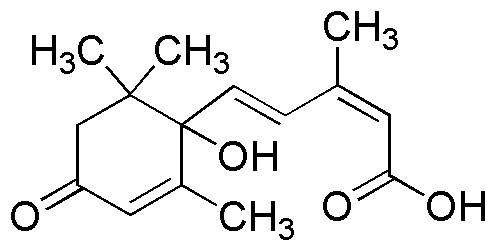(±)-Abscisic acid is widely utilized in research focused on:
- Plant Stress Response: This compound plays a crucial role in helping plants manage stress conditions such as drought and salinity. Researchers use it to study how plants adapt to environmental challenges, which can lead to the development of more resilient crop varieties.
- Agricultural Enhancements: In agriculture, it is applied to improve seed germination and enhance fruit ripening. Farmers and agronomists utilize it to optimize crop yields and improve quality, particularly in fruit and vegetable production.
- Pharmaceutical Research: Its potential therapeutic effects are being explored in medicine, particularly for conditions related to inflammation and metabolic disorders. This opens avenues for developing new treatments that leverage its natural properties.
- Biotechnology: In biotechnology, it is used to manipulate plant growth and development in genetically modified organisms (GMOs). This application helps in creating plants with desirable traits, such as increased resistance to pests or improved nutritional content.
- Environmental Studies: It is also significant in ecological research, where it helps scientists understand plant interactions with their environment. This knowledge is vital for conservation efforts and sustainable land management practices.
General Information
Properties
Safety and Regulations
Applications
(±)-Abscisic acid is widely utilized in research focused on:
- Plant Stress Response: This compound plays a crucial role in helping plants manage stress conditions such as drought and salinity. Researchers use it to study how plants adapt to environmental challenges, which can lead to the development of more resilient crop varieties.
- Agricultural Enhancements: In agriculture, it is applied to improve seed germination and enhance fruit ripening. Farmers and agronomists utilize it to optimize crop yields and improve quality, particularly in fruit and vegetable production.
- Pharmaceutical Research: Its potential therapeutic effects are being explored in medicine, particularly for conditions related to inflammation and metabolic disorders. This opens avenues for developing new treatments that leverage its natural properties.
- Biotechnology: In biotechnology, it is used to manipulate plant growth and development in genetically modified organisms (GMOs). This application helps in creating plants with desirable traits, such as increased resistance to pests or improved nutritional content.
- Environmental Studies: It is also significant in ecological research, where it helps scientists understand plant interactions with their environment. This knowledge is vital for conservation efforts and sustainable land management practices.
Documents
Safety Data Sheets (SDS)
The SDS provides comprehensive safety information on handling, storage, and disposal of the product.
Product Specification (PS)
The PS provides a comprehensive breakdown of the product’s properties, including chemical composition, physical state, purity, and storage requirements. It also details acceptable quality ranges and the product's intended applications.
Certificates of Analysis (COA)
Search for Certificates of Analysis (COA) by entering the products Lot Number. Lot and Batch Numbers can be found on a product’s label following the words ‘Lot’ or ‘Batch’.
Numéro de catalogue
Numéro de lot/série
Certificates Of Origin (COO)
This COO confirms the country where the product was manufactured, and also details the materials and components used in it and whether it is derived from natural, synthetic, or other specific sources. This certificate may be required for customs, trade, and regulatory compliance.
Numéro de catalogue
Numéro de lot/série
Safety Data Sheets (SDS)
The SDS provides comprehensive safety information on handling, storage, and disposal of the product.
DownloadProduct Specification (PS)
The PS provides a comprehensive breakdown of the product’s properties, including chemical composition, physical state, purity, and storage requirements. It also details acceptable quality ranges and the product's intended applications.
DownloadCertificates of Analysis (COA)
Search for Certificates of Analysis (COA) by entering the products Lot Number. Lot and Batch Numbers can be found on a product’s label following the words ‘Lot’ or ‘Batch’.
Numéro de catalogue
Numéro de lot/série
Certificates Of Origin (COO)
This COO confirms the country where the product was manufactured, and also details the materials and components used in it and whether it is derived from natural, synthetic, or other specific sources. This certificate may be required for customs, trade, and regulatory compliance.


